Some people take the time to weigh the potential costs and benefits of participating in a given activity before deciding what to do. Social scientists and researchers refer to this forward-thinking outlook as a future orientation or a future-oriented time perspective. In a study scheduled for publication in July 2014 in the journal Addictive Behaviors, researchers from Canada’s University of Waterloo sought to determine how a future orientation helps predict the likelihood that any given person will succeed in the attempt to quit smoking. These researchers concluded that a couple of key factors help explain the smoking cessation-related benefits of a future-oriented time perspective.
Nicotine Addiction And Smoking Cessation
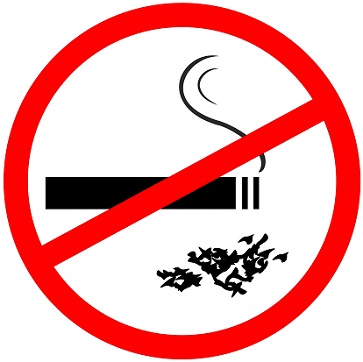 According to figures compiled by the Centers for Disease Control and Prevention, most of the people who smoke cigarettes in the U.S. are physically dependent on nicotine, the main active ingredient in all types of tobacco. Unfortunately, for a number of reasons, nicotine dependence/addiction is fairly easy to acquire and fairly hard to overcome. Doctors, addiction specialists and public health officials refer to the attempt to stop smoking cigarettes as smoking cessation. More than two-thirds of American cigarette smokers openly express a desire to stop smoking entirely and establish a long-term nicotine-free lifestyle. In line with this fact, millions of Americans make an effort at smoking cessation every year; however relatively few people successfully quit smoking for more than a few days or weeks.
According to figures compiled by the Centers for Disease Control and Prevention, most of the people who smoke cigarettes in the U.S. are physically dependent on nicotine, the main active ingredient in all types of tobacco. Unfortunately, for a number of reasons, nicotine dependence/addiction is fairly easy to acquire and fairly hard to overcome. Doctors, addiction specialists and public health officials refer to the attempt to stop smoking cigarettes as smoking cessation. More than two-thirds of American cigarette smokers openly express a desire to stop smoking entirely and establish a long-term nicotine-free lifestyle. In line with this fact, millions of Americans make an effort at smoking cessation every year; however relatively few people successfully quit smoking for more than a few days or weeks.
There are several scientifically proven methods to increase the odds of achieving and maintaining smoking abstinence, including nicotine replacement therapy, use of non-nicotine-based medications such as Chantix (varenicline) or Zyban (buproprion), and non-medication-based approaches such as in-person or remotely delivered behavioral therapy and informative sessions called brief interventions. However, most people in the U.S. who try to quit smoking do not rely on one of these well-tested options.
Time Perspective And Future Orientation
As a rule, most people primarily focus their thoughts and actions on events that happened in the past, events happening in the present or events that may occur in the future. The frame of reference in use determines any given individual’s time perspective. Two of the time perspectives have a particular bearing on substance use, abuse and addiction: a hedonistic view of the present and a future-oriented perspective that emphasizes the benefits of delayed gratification. Generally speaking, people who have a hedonistic perspective on the present value impulsive actions and short-term rewards over carefully considered actions and long-term rewards. Conversely, people who have a future-oriented perspective value carefully considered actions and long-term rewards over impulsive actions and short-term rewards.
Time Perspective’s Impact On Smoking Cessation Success
Doctors and researchers know that people with a future-oriented perspective commonly receive long-term benefits in the form of improved or well-maintained health. Smoking cessation success is one of these potential health benefits. In the study published in Addictive Behaviors, the University of Waterloo researchers used a large-scale survey of smokers living in Canada, the U.S., Great Britain and Australia to investigate exactly why future orientation has a positive influence on smoking cessation attempts. All told, this survey included information from 9,772 people; it covered topics that included the day-to-day time perspective of each participant, each participant’s level of personal motivation to quit smoking, the number of quit attempts over an eight-year period of time and the relative success of any quit attempts during the same time frame.
After analyzing the survey results, the researchers confirmed that cigarette users with a future-oriented time perspective successfully quit smoking more often than their counterparts who don’t have a future-oriented perspective. When they looked at the underlying reasons for the different outcomes in the two types of smokers, they found that the future-oriented individuals who successfully stopped smoking typically had a higher level of motivation during the cessation process and sustained their active participation in this process for longer amounts of time.
The authors of the study published in Addictive Behaviors note that their project is the first attempt to explore the link between future orientation and smoking cessation success in current or recent smokers located in more than one country. In addition, they note that the link between a future-oriented time perspective and success in smoking cessation was found in all four countries under consideration. The study’s authors believe that the two factors uncovered during the study—heightened motivation and sustained participation during quit attempts—may be the main explanatory factors for the positive outcomes in future-oriented smokers.
How Stimulant And Smoking Addictions Can Be Treated Together
Call Us Now To Break Free From Your Addictions!
07 Aug 2014
The Place For Alternative Medicine In Addiction
Alternative medicine is gaining popularity as people begin to turn to natural practices in medicine, many of which have been used for centuries in cultures around the world. Some prefer to use alternative medicine, while others turn to practitioners when modern medicine has failed. Today, alternative medicine touches all areas of healing, including addiction. Many rehab facilities are beginning to incorporate some of these techniques.
What Is Alternative Medicine?
Among the different terms referring to alternative medicine, a few stand out. Alternative refers to any practice outside mainstream, modern, Western medicine. Some prefer the term holistic medicine, which means treating the whole person instead of treating a disease or a set of symptoms alone. Holistic approaches use many alternative practices. Complementary medicine is another term commonly used. These are alternative medicine practices that are used in conjunction with traditional treatments.
What Kinds Of Alternative Therapies Are Used For Addiction Treatment?
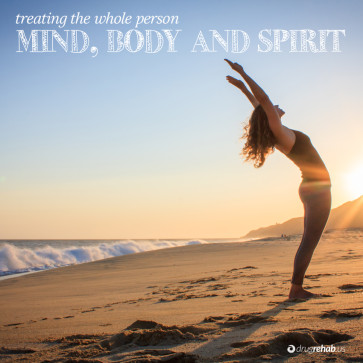 Alternative medicine encompasses a variety of practices from ancient Chinese herbal remedies to modern biofeedback equipment. A few of these have found a place in addiction rehab and have helped some people in their battle to give up drugs or alcohol. Acupuncture, which comes from traditional Chinese medicine, is a practice that involves inserting thin needles into the skin. Acupuncture is believed by some to help reduce cravings and the urge to relapse.
Alternative medicine encompasses a variety of practices from ancient Chinese herbal remedies to modern biofeedback equipment. A few of these have found a place in addiction rehab and have helped some people in their battle to give up drugs or alcohol. Acupuncture, which comes from traditional Chinese medicine, is a practice that involves inserting thin needles into the skin. Acupuncture is believed by some to help reduce cravings and the urge to relapse.
Meditation and yoga are also often used as components of addiction treatment. Both come from ancient India and are great for relaxation and stress relief. Yoga is a type of exercise that involves using controlled movements. Research has proven that yoga helps people manage stress. When you can reduce stress in your life you can better resist the urge to abuse substances. Meditation has a similar effect; it helps focus the mind and control will. Turning to meditation when craving occurs can be a very powerful and effective tool.
Other types of alternative medicine may be used during addiction treatment, although research as to their effectiveness is limited. Some of these include art therapy, equine therapy (working with horses), massage therapy, herbal supplements, prayer or spiritual enrichment and hypnosis. Some rehab facilities may also use biofeedback and neurofeedback. These are techniques that use equipment to measure body and brain processes so that you can learn to control them. In neurofeedback, brain waves are retrained to a normal pattern to help reduce cravings.
Should I Use Alternative Medicine To Help Treat Addiction?
Whether alternative medicine practices can help you overcome addiction is uncertain. There is evidence for some of the more common practices like yoga and meditation, but others have received limited attention from researchers. For the most part, these practices are safe and it can’t hurt to try them. If they work for you and help you to stay sober and resist cravings, use them.
Only choose to participate in alternative medical care from experienced practitioners. If certain techniques are of interest, speak to your therapist, clinical team or doctor to get resources for practitioners who have worked with addicts. Most techniques are safe, but in the wrong hands there could be consequences or side effects. Also remember that alternative medicine should be used only in addition to primary addiction treatment. It is also necessary to keep up with therapy or support group sessions. The combination of traditional and alternative medicine, however, may prove to be just the right plan that works for you.
Read Our Other Posts On Addiction Recovery!
06 Aug 2014
Tips To Cope With Relapse As A Woman
Addiction is a problem that affects both men and women. It doesn’t discriminate. But how we cope with addiction, how we heal from it and how we relapse does depend on our gender. As a woman your motivations for using drugs or alcohol again, after a period of sobriety, are likely different from a man’s. The best way to cope and get back on your feet will also differ for you as a woman. If you do relapse, realize that there are effective ways to help you cope and get sober again.
Women And Relapse
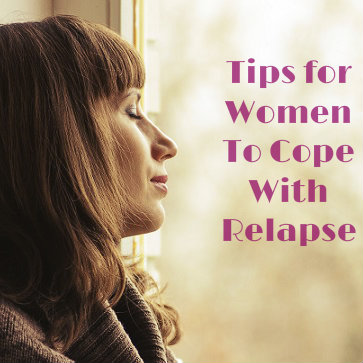 Researchers have found that there are differences between the genders with respect to addiction, treatment and relapse. One study looked at thousands of alcoholics, both men and women, receiving treatment. Each participant attended an assigned style of treatment, but all were allowed to go to support group meetings in addition to their official programs. All then reported on how they fared in terms of sobriety, relapse and support.
Researchers have found that there are differences between the genders with respect to addiction, treatment and relapse. One study looked at thousands of alcoholics, both men and women, receiving treatment. Each participant attended an assigned style of treatment, but all were allowed to go to support group meetings in addition to their official programs. All then reported on how they fared in terms of sobriety, relapse and support.
The researchers found that men who took advantage of support groups, such as Alcoholics Anonymous, did so to make non-drinking friends and to build up a support network to help them avoid the temptations of being around alcohol. For men, being in social situations with alcohol was the biggest trigger to relapse. The study found that this wasn’t the case for women. For us, the biggest trigger is emotional. Women used support groups to cope with their emotions, like depression or anxiety, which tempted them to relapse and start drinking again.
Women And Emotions
Knowing that as a woman your primary triggers for relapse are your feelings and state of mind, you have a powerful piece of information. Knowing your triggers is the key to avoiding them and avoid having a relapse. With emotions backing your relapse triggers, it is more important than ever to pay attention to and care for your emotional life. Here’s what you can do:
Tips To Cope With Relapse And Emotions
- Stay in counseling – Therapy or counseling sessions help you recognize, regulate, and control your emotions. Many people who have gone through rehab simply stop attending sessions thinking they no longer need the help. You may not need your therapist as often as you once did, but you still need some check-ups. Keep a regular, even if infrequent, schedule of counseling sessions for emotional maintenance.
- Practice relaxation techniques – When your emotions start to build and you feel angry, lonely or depressed, you may want to turn back to your habit. Instead, turn to meditation, yoga, and other practices that help you relax and re-focus. These can be very powerful ways to control your urges to relapse.
- Take care of your body – Too often we are too busy to take good care of ourselves, but our emotional states are connected to our physical states. Eat well, get plenty of sleep every night, and get regular exercise and you will feel better every day.
- Get involved – Being intellectually and socially engaged with the world around you can help you to better cope with your emotions. Having a support network is important in helping you resist relapse urges, but so is engaging your mind. Try new activities and develop new hobbies and skills.
As a woman you face unique problems associated with your addiction and your potential to relapse. Unlike men, we are driven to abuse substances by our emotions. We cope with our feelings by using drugs or by drinking. When you can learn to recognize your destructive emotions and cope with them, you can avoid relapsing and stay sober.
Read Our Other Informative Addiction Blogs To Help Women!
05 Aug 2014
Do 12-Step Programs Work?
The 12 Steps have long been a key element of addiction treatment and recovery. For decades, the majority of treatment programs have used the 12 Steps, while addicts in recovery have attended AA and other 12-Step meetings in order to maintain sobriety. These programs have come under a great deal of scrutiny with some people singing their praises and others discounting them and even calling them dangerous. If you are facing addiction and want to get or stay sober, should you consider joining a 12-Step support group? Do they actually work?
Criticism Of The 12 Steps
 There are many who criticize these kinds of programs, including AA, but also any organization that uses the 12-Step philosophy. Addiction experts don’t all agree, but those who do not like the 12-Step philosophy have several arguments. One is that it requires you to admit to being powerless in the face of your addiction. Some would say that the statement is not only false, but also counter-productive. If you are helpless and can’t exert power over your addiction, how can you possibly get better? Others claim that the statistics simply show 12-Step programs don’t work for most people. Success rates have been measured as low as 10 percent.
There are many who criticize these kinds of programs, including AA, but also any organization that uses the 12-Step philosophy. Addiction experts don’t all agree, but those who do not like the 12-Step philosophy have several arguments. One is that it requires you to admit to being powerless in the face of your addiction. Some would say that the statement is not only false, but also counter-productive. If you are helpless and can’t exert power over your addiction, how can you possibly get better? Others claim that the statistics simply show 12-Step programs don’t work for most people. Success rates have been measured as low as 10 percent.
More serious criticisms come from members who have had bad experiences. Some claim that these support groups are gathering grounds for people with violent tendencies or for predators looking for weak victims. There certainly have been terrible incidents involving addiction support groups. One reason for this is that criminal offenders are often forced to attend meetings as a part of sentencing.
How The 12 Steps Can Help
While there are critics, there are also supporters of 12-Step programs and those who praise the effectiveness of such groups. In fact, recent research has shown that recovering addicts who are deeply involved in a 12-Step group are more likely to avoid relapsing. The study compared recovering addicts leaving treatment and going into a sober living house, a 12-Step program, or simply going home. Those who went to a 12-Step group and really got involved in it were nearly three times more likely to abstain than those who did not. Participants in sober living were the most successful.
One of the most important aspects of the findings is the comparison between the different levels of participation in a 12-Step group. The researchers looked at those who met all criteria for active involvement as well as those who did not. The former were people who engaged in service work, made use of a sponsor, read group literature and called other group members for support. These people were more successful at abstaining than those who simply attended meetings, but didn’t get more involved. The study extended two years beyond treatment and found the same results throughout the two-year period.
The results of the study clearly show that a 12-Step program can help you stay sober if you take the right steps. First, you need to have already completed an addiction treatment program. Simply relying on a 12-Step group to get you sober is not enough. Once you have completed treatment, a 12-Step program can help you stay sober, but only if you get involved. Throw yourself headlong into the support, reach out to others, help others and you can reap the benefits of this decades-long philosophy of sobriety. Join half-heartedly and you may not get all the benefits. The 12-Steps can help you, but you have to do it right.
Find Out If Methadone Users Can Participate In A 12-Step Program
Contact Us Now For More Information On 12-Step Programs! Freedom From Addiction Is Possible!
04 Aug 2014
How To Cope With A Dual Diagnosis
Addiction and mental illness often go together. If you are addicted to drugs or alcohol, the effects of those substances in your brain can bring on symptoms of depression, anxiety or other mental health disorders. Conversely, if you have a mental illness you may medicate yourself using drugs or alcohol. If you have received a dual diagnosis and are struggling with both mental illness and addiction, there is hope and there is help.
 You Are Not Alone
You Are Not Alone
It may come as a surprise to you when you find out you have been struggling with a mental illness. Getting that diagnosis is never easy to face, but know that you are far from alone. Nearly half of all people with a severe mental illness also have substance abuse issues. Furthermore, half of people who abuse drugs and a third of people who abuse alcohol also struggle with mental illness. Anxiety disorders and depression are the most common mental illnesses that co-occur with addiction. Bipolar disorder and schizophrenia are also seen together with addiction.
Learn About Your Illnesses
When you get that diagnosis for depression, anxiety disorder or any other mental health issue and you also realize you have a problem with drugs or alcohol, it may feel like a light bulb went off in your head. Certain behaviors and feelings may begin to make more sense. To truly understand what is going on in your brain and to empower yourself to act, learn more about both mental health and addiction. The more you know the less mysterious and sinister it will seem. In educating yourself you will also begin to learn about treatment options.
Get Treatment For Addiction And Mental Illness
Getting treatment is important when you have a dual diagnosis. Either you have been self-medicating to treat your mental health symptoms or your symptoms have worsened because of your substance abuse. In either case, you are stuck in a harmful pattern of behaviors. Experts agree that you should treat both issues to get well. One may take precedence over the other, though. For instance, if your substance abuse is wreaking havoc on your physical health and running your life you may need to address your addiction first.
Start with your primary care doctor if you aren’t sure where to go to get help. Your doctor can recommend psychologists or therapists who can get you on the right treatment path for you. You may need to spend some time in a rehab facility. If you do, make sure you look for a program that is experienced in treating people with a dual diagnosis. You don’t want to ignore either one of your issues while treating the other.
Look For Support
Above all, when you find out that you have both an addictive disorder and a mental health disorder it is important to rely on friends and family. A strong support network is one of the most important ways that you can cope with your recovery and treatment. Getting professional help is necessary, but without the support of loved ones, you are at serious risk of relapsing after completing a treatment program.
Support groups can help too. Look for group meetings for alcohol or drug addiction, but also for meetings for people with mental health issues. If you need to join two different groups to meet your needs, that’s fine; just make sure that you have a group of people with whom you can share your feelings and experiences. It will make a big difference to your recovery. Getting a dual diagnosis is not easy to hear, but remember that you are not alone and that there are caring professionals ready to help you.
01 Aug 2014
How To Avoid Getting Hooked On Sleeping Pills
When most of us think about addiction, we envision someone shooting up heroin, smoking meth or drinking nonstop. Did you know that you can develop a dependence on drugs that seem much more harmless? We tend to think of prescriptions as safe because they are prescribed by doctors, but you should always be aware of the risks of any drugs you take. Sleeping pills are used commonly in the U.S. and it is possible to become addicted to them. If you need sleep aids, find out what the dangers are and learn how not to become dependent on them.
Can A Pill Cure My Sleeping Problems?
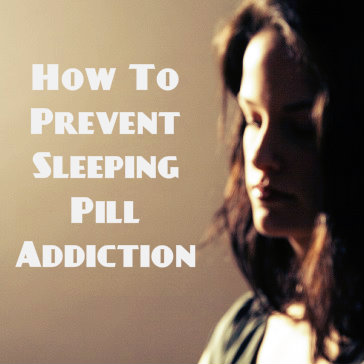 Too many people rely on sleep aids to get a good night’s rest without dealing with their underlying problems. Being unable to sleep is usually a symptom of another problem. You may struggle to sleep because you have another medical condition, but it’s more likely that your insomnia is related to stress. While a sleep aid may help you get some rest, it is not the answer to your problems. Sleeping pills are designed for short-term use, not for lifelong treatment.
Too many people rely on sleep aids to get a good night’s rest without dealing with their underlying problems. Being unable to sleep is usually a symptom of another problem. You may struggle to sleep because you have another medical condition, but it’s more likely that your insomnia is related to stress. While a sleep aid may help you get some rest, it is not the answer to your problems. Sleeping pills are designed for short-term use, not for lifelong treatment.
Are Sleeping Pills Addictive?
If you do use your sleep aid for a long period of time or if you deviate from your doctor’s instructions, you run the risk of experiencing side effects, of not solving the underlying problem causing insomnia and of developing a dependence on the medication. The risk level depends on the medication. Sleep aids include those that help you fall asleep and those that help you stay asleep through the night.
In the first category is Lunesta, which can cause withdrawal symptoms, and Halcion and Sonata, both of which are habit-forming. Among the drugs that can help you stay asleep all night are Estazolam and Restoril, both of which are also habit-forming. There are other sleeping pills that can be prescribed, which are not habit-forming and which do not cause withdrawal when you stop using them. Each one comes with its own list of side effects and some may not work well for you. Which one you take is a decision you and your doctor should make.
Some prescription sleeping pills are habit-forming, which means they are susceptible to abuse and can lead to addiction. Even with those medications that are not considered addictive, there is a risk of developing dependence. When you rely on a pill to get to sleep at night you may become psychologically dependent on it. The idea of not having that crutch to help you sleep can cause anxiety and lead you to keep using the medication, even when you no longer need it.
How Can I Take Sleeping Pills Safely?
The most important consideration in taking prescription sleep aids is to follow your doctor’s instructions. Speak up and discuss with your doctor if you feel like you are becoming dependent on your sleeping pill. Even over-the-counter sleep aids can lead to dependence if you are relying on them every night. If you need to take one for several nights in a row, talk to your doctor so that you can address the underlying reasons for your insomnia.
A sleep aid can be a good way to catch up on rest, but it is not a solution to your problem. Make sure that you get treatment for your insomnia. This may mean going through counseling to address any psychological issues keeping you awake, or trying natural methods or alternative medicine. Always take care when using prescriptions of any kind and keep yourself informed as to the risks and the possibility of dependency.
31 Jul 2014
The Downside Of Legalizing Marijuana
When examining the issue of marijuana legalization, pros and cons fill up both sides of the balance sheet. But while there may be some benefits to legalization, it should be noted that benefits of pot legalization do not directly translate to benefits of pot use. While the downsides and dangers of pot use are plentiful, that is a separate issue.
Marijuana – Not Harmless Or Equivalent To Medicine
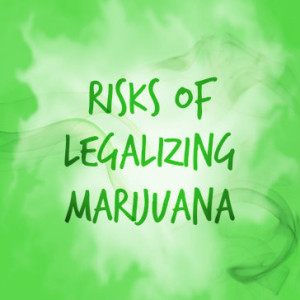 One of the primary cons of marijuana legalization is the mixed message it sends to users and potential users, especially teens. Proponents of marijuana legalization speak of health benefits or cite it as a treatment for chronic pain or for the relief of symptoms associated with chronic illnesses such as cancer, multiple sclerosis and even AIDS. This language takes marijuana out of the realm of “illicit drug” and into the category of “alternative medicine.” If not seen as a substance that promotes health, it will, at least be seen as harmless. Unfortunately marijuana is not harmless, nor is it akin to medicine.
One of the primary cons of marijuana legalization is the mixed message it sends to users and potential users, especially teens. Proponents of marijuana legalization speak of health benefits or cite it as a treatment for chronic pain or for the relief of symptoms associated with chronic illnesses such as cancer, multiple sclerosis and even AIDS. This language takes marijuana out of the realm of “illicit drug” and into the category of “alternative medicine.” If not seen as a substance that promotes health, it will, at least be seen as harmless. Unfortunately marijuana is not harmless, nor is it akin to medicine.
Though marijuana has been legalized in some states for medical use, that does not mean it has been approved by the FDA as a treatment for any sort of medical condition. Nor should it be linked with other non-FDA approved treatments and therapies such as herbal remedies, alternative medicines or vitamins. Regardless of its legal status, marijuana is a drug and it carries with it health risks and consequences. And voting to legalize it actually undermines the authority of the FDA, putting the task of approving drugs and medical treatments into the hands of voters and legislators.
High Risk For Dependence And Health Consequences
Questionable health benefits notwithstanding, people who use marijuana for medical or recreational purposes are building a relationship with a substance that carries a high risk of dependence and addiction. Using marijuana “medically” does not mean that one is exempt from short-term memory loss, that cognitive function is not impaired, that lung tissue is not damaged or that it may not become a gateway drug to more potent and dangerous substances.
Risks Outweigh Suggested “Benefits”
Those who oppose legalization continue to argue that any suggested benefits of marijuana use are far overshadowed by the risks and dangers. Anti-legalization doctors and scientists demonstrate that there are no measurable health benefits of marijuana use. The scientific research does not support the claims and adequate, reliable research has not been conducted. The conditions for which medical marijuana may be useful are broad and vague. Opponents also note that the legal, non-marijuana therapies currently on the market are more effective in treating the conditions for which pot is suggested
The cons of legalizing marijuana are many. Though marijuana may have some suggested (though not scientifically proven) health benefits, it is important to remember that those benefits come with risk as well. Legalization of marijuana not only sends the wrong message to young people about what is medicine and what isn’t, what is healthy and acceptable for use and what isn’t, it also may open the door to increased legalization of pot for recreational use. This in turn may lead to the demand for more hardcore illicit drugs, not to mention an increase in the national addiction epidemic.
Learn More About Drug Rehab Addiction News And Laws
30 Jul 2014
Is Alcohol Ruining Your Relationships?
You don’t need to be an alcoholic to have a problem with alcohol. Many people still believe that raging alcoholics are the only people who abuse alcohol. There are many signs that indicate you may have a problem, and one of the biggest is the way in which drinking effects your relationships. Whether it’s with your kids, spouse, parents or anyone else important to you, if alcohol is negatively impacting your relationships with other people, you have a problem.
Relationship Problems Signal Alcohol Abuse
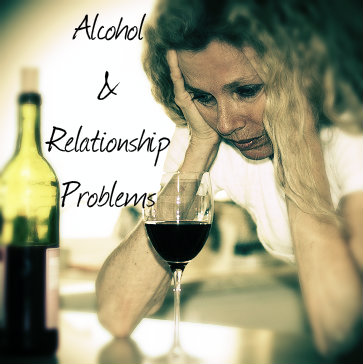 Having a problem with alcohol does not look the same from one person to the next. There are varying degrees, from the initial stages of abuse to full-blown non-functioning alcoholic. If you are questioning your relationship with alcohol, you should be aware of the signs of abuse. One of the most obvious ones is continuing to drink in spite of problems it creates in your relationships. Maybe you and your spouse only fight when you’re drunk. Or, you forget to pick your kids up from activities because you’re out at the bar with friends. Whatever it is, if drinking is at the root of a problem in one of your relationships, you are abusing alcohol.
Having a problem with alcohol does not look the same from one person to the next. There are varying degrees, from the initial stages of abuse to full-blown non-functioning alcoholic. If you are questioning your relationship with alcohol, you should be aware of the signs of abuse. One of the most obvious ones is continuing to drink in spite of problems it creates in your relationships. Maybe you and your spouse only fight when you’re drunk. Or, you forget to pick your kids up from activities because you’re out at the bar with friends. Whatever it is, if drinking is at the root of a problem in one of your relationships, you are abusing alcohol.
Alcohol Makes You Argue
One of the things many of us like about drinking is that it makes us feel bolder. Alcohol works in the brain to lower inhibitions, which is why you may feel more inclined to speak your mind when you’ve been drinking. An argument you would never start when sober often feels right when you’re tipsy. Arguing on a regular basis, especially unfruitful arguments fueled by alcohol, is not good for any relationship. Furthermore, many people also get aggressive when drinking. If you are normally a peaceful person but you feel angry when you drink, the people you care about around you are the ones who will suffer from your wrath.
Alcohol Takes Priority in Your Life
Constant arguing is bad for your relationships, but so is neglect. Another common relationship problem fueled by drinking is misplacement of priorities. If your spouse feels neglected because you would rather go out drinking with buddies, you are placing alcohol ahead of her on your list. The same can often happen with kids. Did you miss a school event or a soccer game because you were too drunk to get there? Your children can feel as if they are unimportant to you, which will have a terrible impact on your relationship with them.
You Deny Having a Problem
When your loved ones approach you to discuss your drinking and how it impacts them, do you brush it off? Do you refuse to admit the effect alcohol is having on your life and relationships? If so, this can further exacerbate the issue. If you can admit to the problem and agree to take steps to correct it, your loved ones will most likely support you. On the other hand, if you continue to deny the problem, you will only further damage your relationships. No change can happen until you open your eyes and see what alcohol has done to the relationships you have with the people you care about.
Your drinking may have already trashed any number of relationships in your life, but take away something positive from this. If you can take a step back and see what impact alcohol has had, you are in a position to make changes before it gets worse. Before you succumb to the disease of alcoholism, you can take steps now to turn your life around. Slow or stop your drinking, repair your relationships and move on with your life.
Learn More About The Link Between Alcoholism And Substance Abuse Among Women With Bipolar Disorder
IF YOU OR SOMEONE YOU LOVE IS STRUGGLING WITH ALCOHOL – PICK UP THE PHONE AND CALL US NOW – HEALING AND PEACE CAN BE YOURS TODAY!


